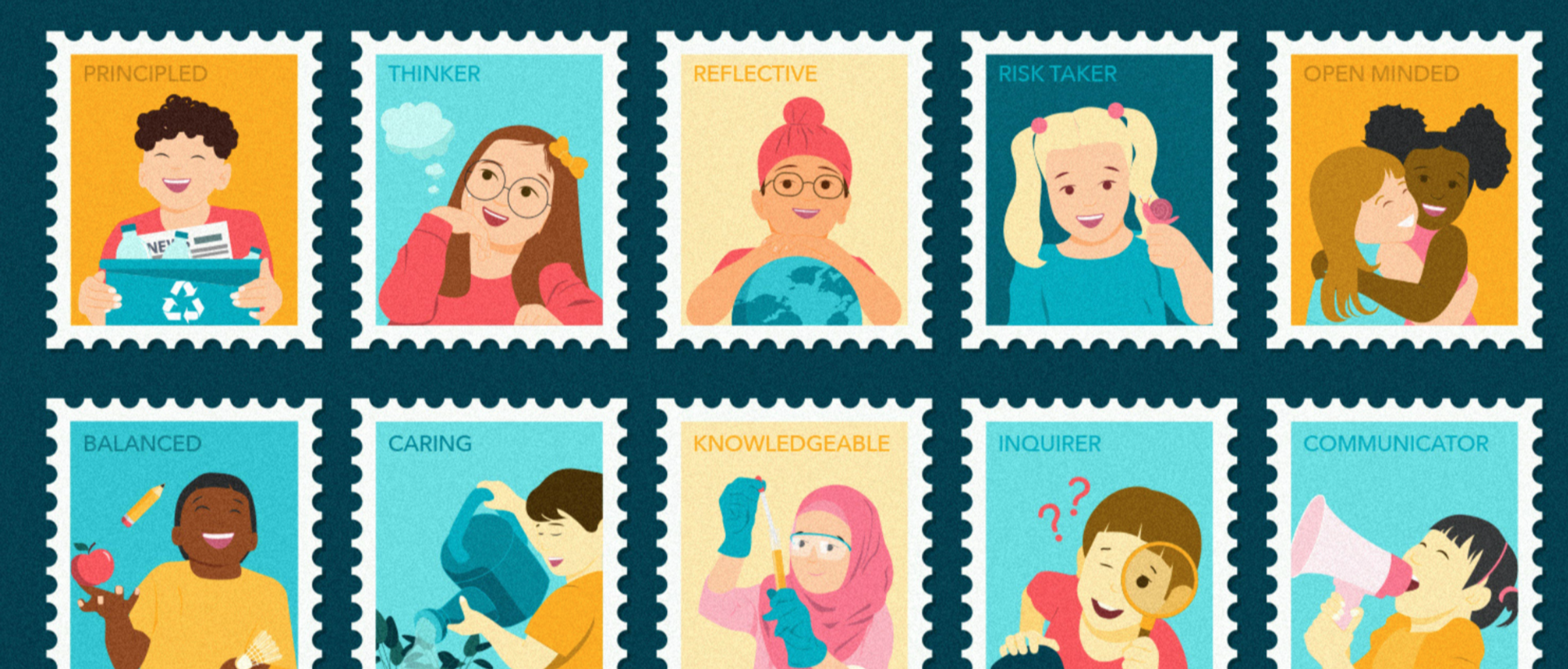Learner Profile Bulletin Board

IB Learner Profile: Caring
The IB Learner profile aims to develop students who are caring. Students who are CARING show empathy, compassion and respect towards the needs and feelings of others. They have a personal commitment to service, and act to make a positive difference to the lives of others and to the environment. They remember to treat others how they themselves would like to be treated.
How can parents help develop students who are CARING?
- Start by practicing empathy. Model the caring behavior you would like to see in your child. Your child notices everything you do! Using kind words, helping others and being an active listener will show your child that you care about other people.
- Help your child consider the feelings of others. Ask, "What do you think she's upset about?" "How would you feel if that happened to you?"
- Read books that demonstrate caring and kindness. Discuss the message of the story and how it can be applied in your every day lives. Ask, "What are some things we can do to show kindness?" "Is there anyone we know that could use some extra caring right now?"
- Brainstorm ways your family can get involved in the community. Send cards to residents of a local nursing home. Donate food, clothing or toys to those in need. Place inspiring quotes around the neighborhood for others to see.
- Reduce, Reuse and Recycle. Sometimes this can be challenging for busy families, but make an effort to establish these habits in your home. By developing children who care about the environment, you are helping the future of the globe.
- Emphasise social skills like saying please, thank you, sharing with siblings and recognizing when others may be having a difficult day.
- Smile
Enemy Pie by Derek Munson
Anticipating the best summer ever, the young narrator of this engaging picture-book about turning enemies into friends laments the arrival of new boy Jeremy Ross in his neighbourhood. Although they don't get off to the best start - Jeremy laughs at him when he is struck out in a game of baseball, and doesn't invite him to his trampoline party - the boy's wise father tells him he has the perfect way to deal with enemies: Enemy Pie. But in order to convince Jeremy to eat it, first the boy must spend an entire day with him.
Enemy Pie is an engaging story about social dynamics among young children, and offers a well-told lesson about building friendships and community, even when we haven't gotten off to the best start with newcomers.
Discussion Questions for Enemy Pie
Why does the main character dislike Jeremy Ross?
Can you make a connection to the main character or Jeremy Ross?
Why do you think the dad doesn’t tell his son what’s in the pie?
Why do you think the enemy pie smells so good?
Why does Jeremy feel confused when the main character asks him to play?
Why doesn’t the main character want Jeremy to eat the pie?
What do you think will happen to Jeremy when he eats the pie?
Was there anything nasty about the pie?
Why do you think the dad called it enemy pie?
How could parents encourage the Learner Profile at home?
The attributes of the profile are what we wish to see students embed in themselves as their personality and character, it is not limited to just behaving in a particular way at school. To continue to apply these traits at home as well parents should incorporate this at home.
- If you role model the caring behaviour you would like to see in your child it will help them understand and imbibe it better. Think about different ways your family can get involved with community organisations.
- Read to your child books at home that correspond with the topics being covered in school. Ask your child about what they’re learning in class and have interactions and conversations about it.
- When working on any assignments, encourage your child to explain his/her answer to you orally or by drawing a picture. Ask your child thought provoking questions and encourage them to debate the same with you. Work together with your child to enhance his/her listening skills. Being an honest listener is a crucial part of communicating with others.
- Spend some time revising your child’s work with them. Discuss it with them and accept their ideas and their strengths and areas for improvement. Ask them to reflect on, how they like to learn and what helps them learn better, what are some of the things that make it hard for them to learn and what can they do when they need help
- Encourage areas of your child’s interest by visiting the library to borrow books that explore topics they are interested in. Develop a deeper understanding through research on the internet.
- Encourage your child to try new things – new foods, new games and new activities. Expose your child to different cultures, festivals, celebrations and traditions.
- Encourage your child to play games that involve teams. Discuss with your child the qualities of a team player. When your child wins a game insist that he or she may be a well-mannered winner Being a gracious loser is simply as important as being an honest winner.
- If your child is feeling uneasy about trying something, encourage them to attempt it and then reflect on both whether they liked the activity and how it felt to try something new. Try an activity they haven’t tried before, spend time playing with someone they might not usually play with. Be careful to clarify to your child the difference between being a risk-taker by trying new things and doing dangerous things.
- Encourage your child to try to think of solutions to problems independently. Ask your children questions when they are working on a problem, how can we do this differently? I had never thought of that. Tell me more about it. What other ways can we show that? Why do you think that?” How did you figure that out?
- Encourage your child to participate in a wide variety of structured activities. During less structured time, even be conscious of the activities that your child is participating in. Generally active kids should take time for quiet reading or reflection; students who spend tons of your time drawing or reading, should be encouraged to also exercise and play.

